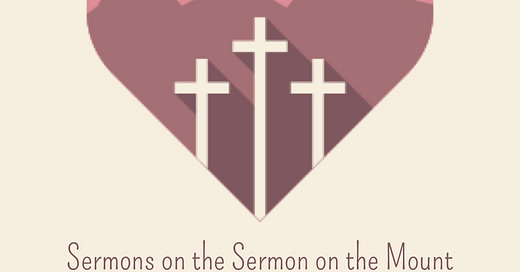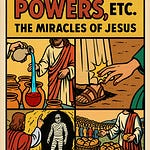Matthew 5.38-48
Back in February 2019 I was sitting in the press box, officially credentialed as a member of the new media, waiting for the opening gavel of the quadrennial waste of money known as General Conference. The global gathering of the United Methodist Church always makes me recall Martin Luther’s crack about the institutional church:“The Church is a whore but she’s my mother!”
In the naive hope that God would miraculously grant a fruitful gathering among one thousand antagonists and ideologues who had nothing in common except for their cross and flame lanyards, the Council of Bishops moved to open the Special Sex Conference with a time of prayer. Almost all of the prayers were the tedious, anodyne type of religious speech you would expect from church bureaucrats; in other words, the kinds of prayers that need not a Living God for you to pray them. Some prayed for openness to differing points of view. Many prayed for unity in essentials and communion in Christ. More than one bishop prayed for “holy conferencing,” the absolute most hilarious lie that could ever be used to describe a denominational gathering. In total contravention of the all the meetings that had preceded the Special Sex Conference, some cruelly optimistic bishop appealed to the Lord for generous spirits, gracious ears, and open minds.
I’d nearly fallen asleep completely when Bishop Will Willimon actually dared to trust the Lord with an honest, truthful prayer:
“Lord, please melt the hardened hearts and smite every tight-sphinctered, self-righteous traditionalist who intends to vote against workable, sane compromise. Dash the troublesome, homophobic Maxie Dunham with a debilitating health event and compel several of Keith Boyette’s grandchildren to come out of the closet to him before he casts his vote. And while you’re at it, Lord, slay all those on both sides who think having the right position on sexuality will somehow save the United Methodist Church from our gospel amnesia.”
Up in the press box, a representative from the Institute on Religion and Democracy— a traditionalist lobby that seems not to understand the Handmaids Tale is a dystopian story— reacted with shrill, feigned horror: “That’s completely inappropriate! Irresponsible! Unchristian! He can’t say those things! How dare a bishop— of all people, a bishop— pray for the destruction of his opponents!”
I looked over at him and replied, “Maybe you all should spend more time with scriptures other than the Levitical Codes. You might not have liked it, but it sure sounded an awful lot like a biblical prayer to me.”
He looked at me and sneered, “Another unbiased member of the media, huh?”
“Hey, it’s a podcast,” I said.
“Pray for those who persecute you,” Jesus teaches in the Sermon on the Mount.
Of course, not only is Jesus fully divine— God from God, light from light, begotten not made, by whom all things were made— Jesus is fully human. Mary’s son is a Jew and, as a Jew, Jesus has in mind very specific prayers for the persecuted to pray. You’ll remember that Jesus always had particular prayers in mind. “Lord, teach us to pray,” the disciples ask— the only time they ever ask Jesus to teach them something. “Alright,” Jesus agrees, "When you pray, pray like this. Don’t just we wing it. Pray this way: Our Father, who art in heaven…”
Whenever Jesus commends the practice of prayer, he has particular prayers in mind.
“Pray for those who persecute you,” Jesus says today, and, as a good Jew, Jesus probably could’ve suggested a few of them from his people’s prayerbook.
We began today’s worship service by praying one of those prayers. Well, not exactly. You may have noticed how the United Methodist Hymnal chops up Psalm 139. We prayed only the familiar, comforting part of the psalm. The United Methodist Church doesn’t trust you with the rest of Israel’s prayer, the part that sounds like Jewels’s monologue in Pulp Fiction.
After praising the Spirit of God abiding in all places and the intricate handiwork of the Lord’s creation and the weighty thoughts of the God who knew all our days before the beginning of any of them, the prayer takes a jarring, fist-shaking turn.
“O that you would kill the wicked, O God,
and that the bloodthirsty would depart from me—
those who speak of you maliciously,
and lift themselves up against you for evil!
Do I not hate those who hate you, O Lord?
And do I not loathe those who rise up against you?
I hate them with perfect hatred.”
Those not very nice thoughts are not in your hymnal; in fact, so far as I can ascertain no denomination includes an unexpurgated psalter. No denomination trusts you with all the prayers the Bible seems untroubled entrusting to you. John Wesley said that there are some psalms that are simply not suited for good Christian ears.
“Surely thou wilt slay the wicked, O God!
Do not I hate them, O Lord, that hate thee?
I hate them with perfect hatred: I count them mine enemies.”
Maybe this is why it feels like every Vacation Bible School lesson is about Zacchaeus, the wee little man in the tree. I mean, these are TMI, TV MA thoughts.
Worse, if you’ve spent any time in Israel’s prayerbook, you know that this brash, unseemly psalm is not an outlier. A good many of Israel’s prayers are imprecatory psalms, prayers invoking judgment, calamity, and curses upon your enemies.
Don’t believe me?
I brought a list:
Psalm 5
Psalm 6
Psalm 11
Psalm 12
Psalm 35
Psalm 37
Psalm 40
Psalm 52
Psalm 54
Psalm 56
Psalm 57
Psalm 58
Psalm 59
Psalm 69
Psalm 79
Psalm 83
Psalm 94
Psalm 109
Psalm 137
Psalm 139
And Psalm 143
Plus a few others.
As C.S. Lewis writes, there are times when you read the prayers of God’s people and “the hatred hits you in the face like the heat of a white hot furnace.”
Perhaps it’s even more disquieting to us that these feelings of rage and vengeance find expression in the psalms we most cherish. Take Psalm 139— It begins so appropriately, predictably, safely spiritual, like something you’d stick on a prayer card for a loved one’s wake. It waxes elegantly about how God knit you together inside your mother’s womb, but then midstream, like a bitter former Christian attempting to sit through that same funeral, as if the psalmist can’t stomach pretending to be pious and sanctified for a single second longer, he blurts out what he’s really feeling:
“Look God— stop underachieving. It’s time to live up to your Almightiness. There is a clear and obvious— and might I add just— solution to Vladimir Putin’s naked aggression and war crimes in Ukraine. Eliminate him. Eradicate him. Annihilate him. Make him mysteriously fall out of a window. Send a Hurricane Ian down on the lot of them. And, while you’re at it, Lord, send that white-washed tomb, Patriarch Kirill, to the hell he so manifestly deserves.”
Or, as the psalmist prays in Psalm 69: "Pour out your indignation on those who persecute me, and let your burning anger overtake them.”
“Pray for those who persecute you,” Jesus commands.
Pray like this when you pray for your enemies.
The United Methodist powers-that-be left all of Psalm 109 out of your hymnals, in which the psalmist prays against his brother,
“May he be convicted by an unjust judge;
May his children be orphans, and his wife a widow.
May his children wander about and beg;
May the creditor seize all that he has;
May there be no one to do him a kindness,
Nor anyone to pity his orphaned children.”
Then there’s the infamous prayer in Psalm 137 that pleads for the Lord to take the babies of Babylon and dash their tiny heads into the the pavement.
Even the most beloved prayer in the entire Bible, Psalm 23, takes a turn towards the grisly. “The Lord is my Shepherd…” that sounds Sunday School safe.
“He leads me beside the still waters…” still waters are better than troubled waters, good.
But then: “Thou preparest a table before me in the presence of mine enemies.”
As familiar as the words are to you, I doubt many of you imagine the scene as King David pictured it, as a feast laid out on a field strewn with bodies and grass stained with blood.
What are we supposed to do with all of this vengeance and desire for violence? Leave it out? Censor it? Redact it? Ignore it, and convince ourselves the Bible is a safe, respectable religious book about flying straight and eating your vegetables. But if we really do believe that this is the word of God for the people of God then we the people have no choice but to take seriously these words.
Or, another way we can handle these nasty bits of the Bible— explain them away.
We can say to ourselves, “The man who wrote that prayer, invoking the murder of Babylonian babies, was a primitive, superstitious, uneducated man who was not nearly as kind, enlightened, and sophisticated as believers are today. We’re not like him. We don’t dash babies against the rocks. We just allow them to be shot up in their schools even while we fire drone strikes at other people’s babies from the faraway comforting confines of what looks like a video game console.”
Let’s be honest.
Let’s be as straightforward about ourselves as the Bible is honest about us. It’s not at all a mystery why there is such blind wrath and rage, knee-jerk anger and disproportionate violence in the Bible’s prayerbook. The desire for vengeance creeps across almost all of Israel’s prayers because that same desire constricts each of our hearts.
In order to pay for law school, a parishioner of mine in my previous appointment signed on to serve as an Army JAG. Back when he was still studying torts and constitutional law, he expected he would one day be dealing with divorces and drunk and disorderlies. He never dreamed he’d find himself in the middle of the worst of the second Iraq war, daily navigating land mines and IEDs and suicide bombers.
He’s still in shock.
Leaving worship one Sunday, after hearing a scripture passage not unlike our passage today, he described to me in a frightened but dispassionate affect the anticlimactic sound a human head makes when a homemade suicide vest ignites.
And without stopping his story, he then said to me, “That’s the problem with you, preacher.”
“The problem with me?”
“You talk about loving our enemies, but you don’t get it. You don’t understand. You’re starting from the wrong place. You start with us too many steps down the board. Where I’m at— I don’t even want to want to love my enemies.”
“Surely thou wilt slay the wicked, O God!
Do not I hate them, O Lord, that hate thee?
I hate them with perfect hatred."
The problem is not with the Bible.
The problem is in you.
In me.
As John Calvin writes, “the psalms are the anatomy of the whole human soul.”
This is the truth of us.
Every time there is an event in the news like the murder of George Floyd or the insurrection on the Capitol or the latest mass shooting, our politicians stand before cameras and microphones and assure us that, “This is not us. This is not who we are.”
And the prayerbook of God’s people replies, “No, Joe. This is exactly who we are.”
It’s no wonder the same psalm that celebrates the wonder of humanity also ponders the mystery of our depravity.
Scripture’s not like Instagram. It doesn’t come with any filters.
Only the Bible dares to speak about us with such unflinching candor.
Maybe you’re sufficiently sanctified and further along the road to perfection. Maybe you’ve never really had the urge to bash in someone’s teeth— you must not be a Verizon Wireless customer. Maybe you have. But in many unseen and smaller ways we do assault people. Verbally. Mentally. Emotionally. We nurse our resentments. We lick our wounds. We curse our neighbors. We lash out at those we love. We yearn for the day when God will finally set the world to rights and the wicked will get what they deserve— what we know they deserve.
Just before Thanksgiving in 2020, I met with one of the teachers in our preschool program, an African American woman about my age.
Afterwards, she and I were walking out Door #2 to head home when a sun-faded car screeched to a stop in the visitor’s spot of the parking lot. The car needed a new muffler but not another partisan bumpersticker. The driver leaned across the passenger seat and rolled the window down with her right hand— I didn’t recognize her— and yelled at me. She was visibly irate.
“Do you go to this church?!”
“Um, sort of, I guess.”
“And do you know the minister at this church?”
“Uh, well, um…Yes, I do know the pastor. His name is Peter Kwon, look him up.”
“Well, you tell that radical, leftist, SOB Peter Kwon to take down that racist, sacrilegious trash before a good, god-fearing patriot takes matters into her own hands.”
With her hand extended towards the windshield, she was pointing at the Black Lives Matter display an artist and a few church members had erected in our yard over that summer.
You may remember it.
It’s since been showcased at churches all over Northern Virginia.
The exhibit is a series of multicolored doors anchored on giant easels and adorned with corroborating verses of scripture. “Black Live Don’t Just Matter,” the doors say, “They’re Sacred.”
“ALL LIVES MATTER,” she shouted at us, flipped us off, and sped away.
For a few moments neither of us said a word, shocked at the gall of the woman and the ever-present, simmering (racist) rage in her. Finally, the teacher at my side, who’s African American, said to me:
“You know, we toss around terms in church like “racial reconciliation” as though we are people different than who we are. You put someone like me in charge of the world— I’m so angry at white people. I don’t think I can be trusted with racial reconciliation.”
“We’re all camels headed towards the eye of a needle,” I replied.
“Love your enemies and pray for them,” Jesus commands in the Sermon on the Mount.
Only, through the very discipline of praying the Bible’s prayers for my enemies I am confronted by the uncomfortable claim that I am not someone who can be trusted to deal with my enemies.
If thus far you’re feeling disappointed or un-flattered by today’s sermon, don’t worry, I can make it worse.
A little later in Matthew’s Gospel, Jesus sizes each of us up and shakes down the state of the world with a parable. According to Jesus, it’s really an allegory.
Living in the Kingdom, living with me, Jesus says, it’s like this:
A farmer sowed good seed in his field, wheat.
Every which way you look over his acreage its amber waves of grain.
But then one night, while his farmhands are fast asleep in the bunkhouse, the farmer’s enemy slips through the barbed-wire fence and scatters bad seed.
The enemy sowed weeds among the wheat.
And the word Jesus uses for weeds is zizania.
It’s scientific name is Lolium temulentum.
In English, it’s darnel, an annual grass that, with its long, slender awns, or bristles, looks so much like wheat you could scarcely distinguish between the two.
When the plants come up and mature and the farmhands discover the fields aren’t as pure and unsullied as they had assumed, they go to the boss and say, “Sir, did you purchase, did we plant, bad seed? How come your fields are covered in weeds?”
“An enemy hath done this,” the boss answers rather cryptically.
“Alright then,” the farmer’s hired hands respond, “I suppose it’s our job now to go and pull up the weeds in your fields.”
“No, no, no,” the farmer replies, “Don’t you dare lift a finger where the weeds are concerned. You boys don’t have nearly the eyes you think you. You start in there trying to pull up the weeds you’ll tear out the wheat too without realizing it and before long the whole farm will be ruined. You just leave the weeds alone. Leave the bad seeds to me. Let the wheat and the weeds grow up together. I’ll take care of it at the harvest when I give the reapers a ring.”
Commenting on this parable, Robert Farrar Capon writes,
“What does this say about the Kingdom and the evil of our enemies in the world? Well, it seems to me to say that programs and pogroms designed to get rid of evil are, by the muddleheadedness of the world and the craft and subtlety of the enemy, doomed to do exactly what the farmer suggests they will do.
Since the only troops available to fight the battle are either too confused or too busy to recognize the real difference between good and evil, all they will accomplish by their frantic pulling out of the weeds is the tearing up of the wheat right along with them.
Worse yet, since good and evil in this world commonly inhabit not only the same field but even the same individual human beings— since, that is, there are no unqualified good guys any more than there are unqualified bad guys— the only result of a truly dedicated campaign to get rid of evil will be the abolition of literally everybody.”
Take note—
It isn’t the case that vengeance is not righteous, holy, and good.
“Vengeance is mine, and recompense,” the Lord declares in the Book of Deuteronomy, “Their foot shall slip in due time; For the day of their calamity is at hand, And the things to come hasten upon them.”
“Give place to wrath,” Paul writes in Romans, "for it is written, “Vengeance is Mine, I will repay,” says the Lord.”
By my count, there are sixty-three other verses like that in scripture.
Gandhi was wrong. An eye for eye doesn’t leave everyone blind. It leaves the scales of justice balanced.
It’s not that vengeance is wrong.
It’s that you and I are not ones to be trusted with it.
The only weapons the Bible trusts us to wield against our enemies are words:
“Surely thou wilt slay the wicked, O God!
Do not I hate them, O Lord, that hate thee?
I hate them with perfect hatred."
This is the underside of grace.
That while we were yet his enemies, God justified the ungodly means that not one of us is a reliable arbiter of justice.
The weeds and the wheat bear a striking resemblance to each other and neither looks much like the farmer.
Your enemy and you are closer in kind than either of you are to Jesus Christ.
Which means, if we’re going to avoid tearing up the whole field, our zeal for justice must always be balanced with a frank inventory of our own sinfulness.
“Love your enemies,” Jesus commands in the Sermon on the Mount.
In other words:
“I don’t trust you people to do anything else with your enemies. I don’t even trust you to be able to distinguish between your enemies and your friends and neighbors. Your eyes and your judgment are both equally bad so just tend to them like they’re all the same.”
Vengeance belongs to God.
That means the fate of the world is not your burden to bear. It’s not your responsibility to purify the planet. Making history come out right is not your charge to keep. It’s left to God.
Not to offend you, but you can’t be trusted with such awesome responsibility.
How can we be expected to set the world to rights when we can’t even correctly identify God when God takes flesh and walks among us in this world?
We thought we were just tearing up another weed; turns out, we killed the Farmer. We took the field into our own hands and we picked up a hammer and we nailed the Farmer to a tree. Thank God his prayer for his enemies is so unlike the prayers pray, “Father, forgive them, for they know not what they do.”
And just in case you have any worry over whether his prayer was answered in the affirmative, come to the table. He is risen indeed. And he is here to say to you, whether you’re a good seed or a bad seed, “This is my body broken for you…”















Share this post